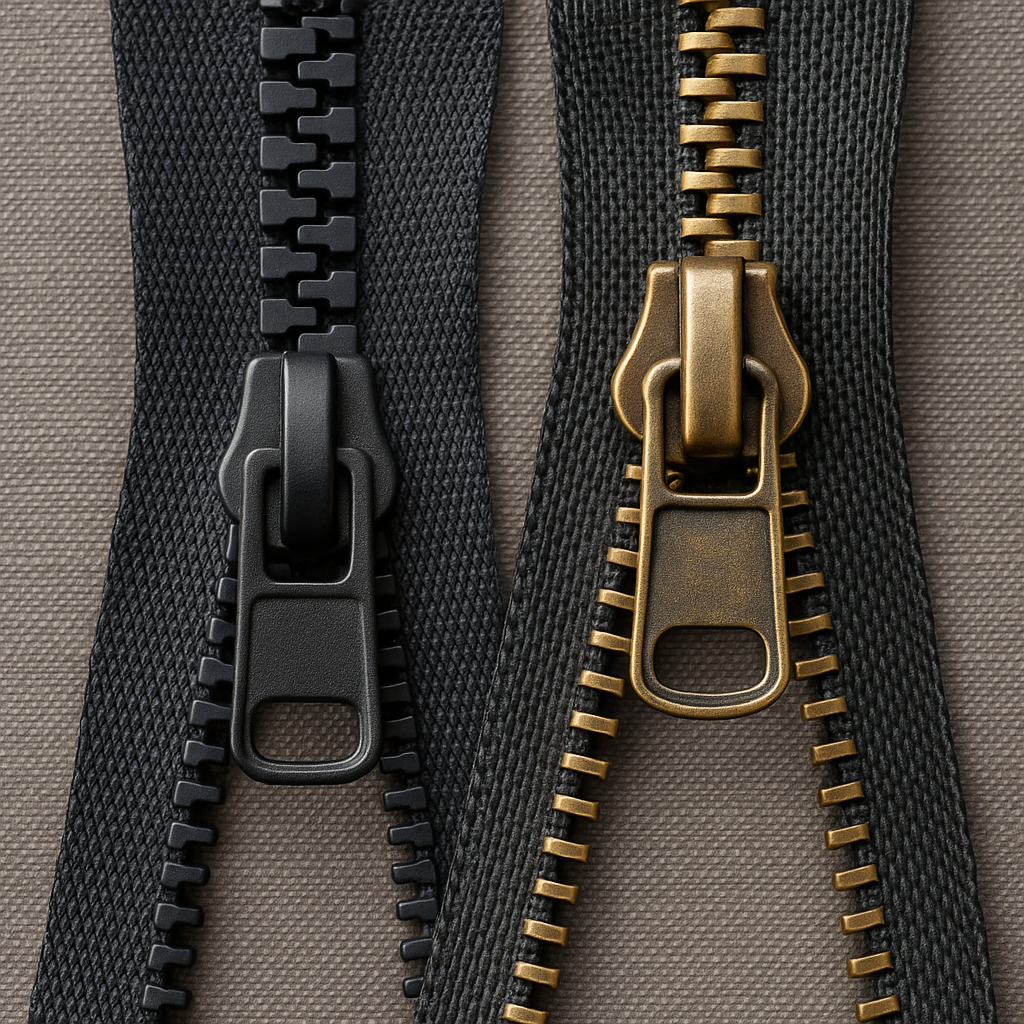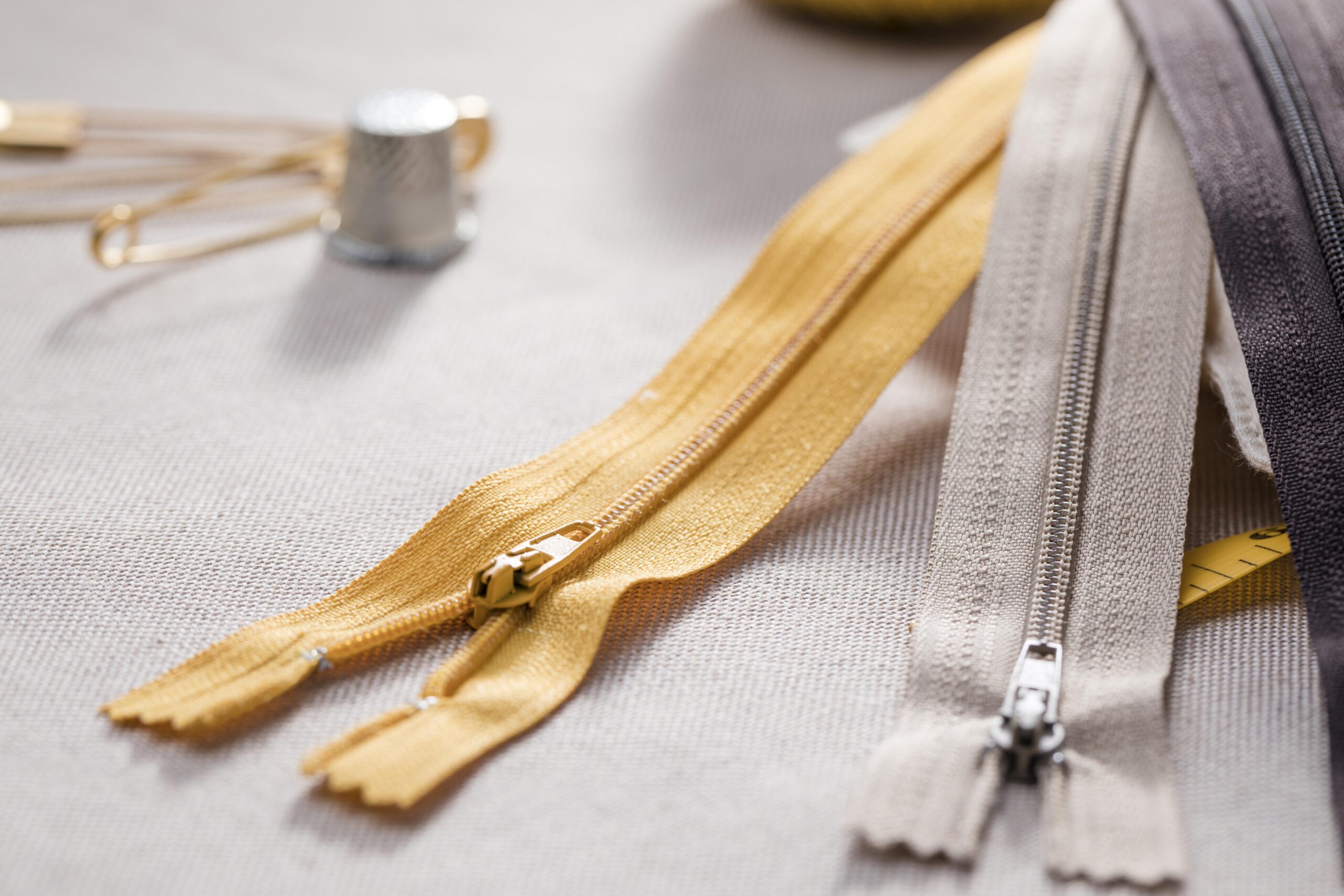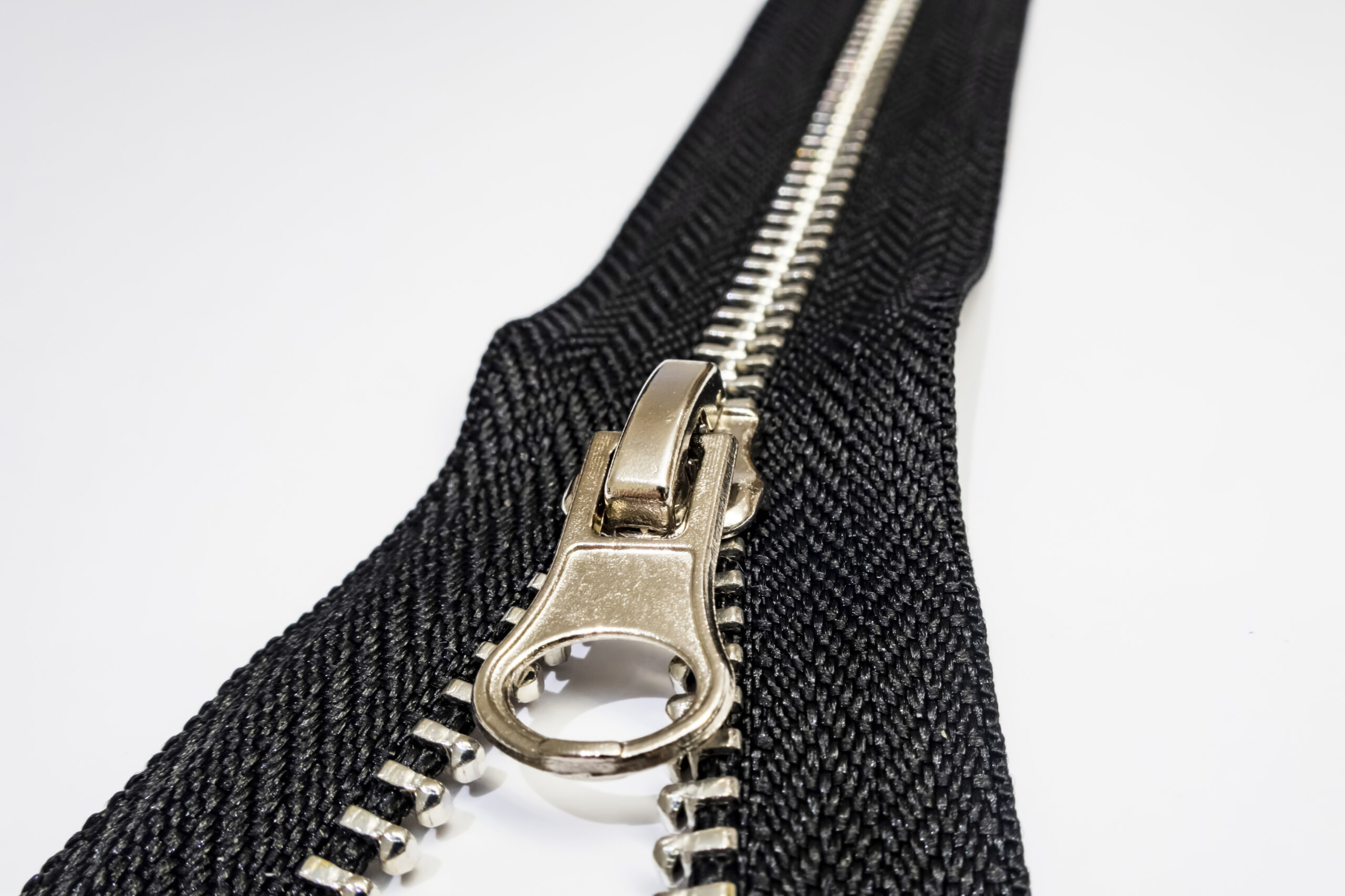Why Zipper Material Matters
Choosing the right zipper isn’t just about aesthetics — it’s about performance, durability, and user experience. Whether you’re designing high-end fashion, building marine covers, or specifying closures for industrial applications, the zipper you choose directly influences your product’s success.
In manufacturing, one of the most common comparisons is metal vs. plastic zippers. Both dominate the market, and both bring unique strengths to the table. Metal zippers deliver raw durability, structure, and timeless appeal. Plastic zippers, by contrast, provide flexibility, corrosion resistance, and lightweight efficiency.
Selecting between the two goes far beyond looks. It requires understanding how materials respond to stress, weather, and user wear over time. Just as our Polypropylene vs. Polyester comparison showed that the right material can define long-term performance, the same principle applies to zipper engineering.
Below, we’ll examine how metal and plastic zippers perform across strength, flexibility, corrosion resistance, cost, and application — helping you choose the ideal closure for your next project.
Quick Comparison Overview
| Feature | Metal Zippers | Plastic Zippers |
|---|---|---|
| Material Base | Brass, nickel, or aluminum | Molded acetal (Delrin) or nylon coil |
| Strength | Exceptional tensile and bite strength | Moderate tensile strength, superior flexibility |
| Corrosion Resistance | May corrode without coating | Naturally corrosion-resistant |
| Weight | Heavier | Lightweight |
| Flexibility | Rigid and structured | Highly flexible and adaptive |
| Cost | Generally higher | More economical |
| Water Resistance | Moderate with coatings | High when paired with sealed tape |
| Common Applications | Denim, luggage, boots, industrial gear | Outdoor apparel, marine covers, technical gear |
Understanding the Core Difference
Think of metal zippers as the muscle cars of the closure world — bold, strong, and built for endurance. Every interlocking tooth creates a tactile, audible sense of strength. That distinct metallic sound when opening or closing isn’t just satisfying — it’s a symbol of reliability.
Plastic zippers, meanwhile, are like high-performance sports coupes — lightweight, smooth, and adaptive. They flex effortlessly with fabric, resist corrosion, and maintain consistent function in moisture-heavy or marine environments.
Both achieve the same purpose: securely joining materials. But they do it with entirely different personalities — one emphasizes strength and heritage, the other focuses on innovation and adaptability.

What Are Metal Zippers?
Metal zippers are crafted from brass, nickel, or aluminum alloys, chosen for their combination of strength, appearance, and corrosion resistance. Each tooth is individually clamped to woven tape, creating a strong mechanical interlock capable of withstanding significant force.
Unlike molded or coil designs, metal teeth don’t rely on shaping plastic — they use compression and precision to lock into place. This gives them unmatched bite strength and tactile feedback, which is why metal zippers are used in products that must convey quality and permanence.
Performance and Design Strengths
Metal zippers are built for endurance. Their tensile and bite strength outclass all other zipper types, making them ideal for high-stress environments. Products like industrial gear, jeans, and boots rely on this strength daily.
They also bring a premium aesthetic. Finishes such as antique brass, brushed nickel, and polished aluminum elevate products with a refined, visible hardware accent — a small but crucial design element that communicates craftsmanship.
A properly treated metal zipper can last for years. At LenZip, we apply protective coatings to resist oxidation and extend life cycles under heavy use. You can learn more about these treatments in our detailed guide on Zipper Materials & Finishes.
Drawbacks of Metal Zippers
Every material has trade-offs. Metal zippers, while strong, are heavier and less flexible than plastic alternatives. That extra weight can be noticeable on garments or equipment requiring lightweight mobility.
Corrosion is another consideration. Without proper coating, metal zippers can oxidize, especially in marine or humid environments. LenZip’s U.S.-made zippers undergo ASTM-standard testing to verify corrosion resistance before they ever reach our customers.
Lastly, because metal teeth are rigid, they don’t conform easily to curved seams. This rigidity adds structure — ideal for leather goods and luggage — but limits use in soft or stretch fabrics.
Despite these limitations, metal zippers remain unmatched in strength and luxury appeal. From denim and boots to industrial uniforms, they symbolize rugged reliability.
What Are Plastic Zippers?
Plastic zippers include molded tooth and nylon coil styles, both engineered for adaptability and weather resistance. Molded plastic teeth are injection-formed directly onto the tape, while coil zippers use a continuous nylon filament stitched along the tape’s edge.
This construction creates smooth, low-friction operation. The lightweight nature of plastic makes it ideal for marine, outdoor, and performance-focused designs where corrosion resistance matters as much as strength.

Performance Advantages
Plastic zippers excel where flexibility and moisture exposure intersect. They are corrosion-proof, immune to rust, and available in an enormous variety of colors and finishes — perfect for branding or custom design.
Their nylon and acetal bases perform exceptionally well in temperature extremes, maintaining functionality in both freezing and tropical conditions. Plastic zippers can even be made water-resistant when paired with coated tapes or sealed seams, a major advantage for outdoor and marine manufacturers.
Explore their structural design in our Guide to Zipper Teeth, Sliders, and Their Parts.
Comparing Metal vs. Plastic Zipper Performance
Strength and Durability
When pure tensile strength is required, metal wins. Its solid tooth construction resists deformation and ensures closure integrity under heavy tension — ideal for denim, workwear, or industrial covers.
However, plastic zippers excel under motion. Their flexibility allows them to bend, twist, and cycle repeatedly without losing alignment. For example, nylon coil zippers are engineered for tens of thousands of open-and-close cycles without jamming, making them the go-to choice for luggage, outerwear, and gear bags.
At LenZip, both types are rigorously tested through our internal Zipper Testing Standards to ensure consistent results across use cases.
Corrosion and Environmental Resistance
In terms of corrosion resistance, plastic clearly leads. Nylon and molded acetal don’t oxidize, making them reliable for marine, outdoor, or chemical environments.
Metal zippers can perform just as well — but only when properly finished. Protective coatings like electroplating, anodizing, or lacquering provide strong defense against rust. Learn how LenZip’s coatings improve zipper lifespan in our Zipper Materials & Finishes resource.
When choosing for a humid or saltwater environment, plastic zippers are often the better option due to their natural chemical stability.
Flexibility and Comfort
Plastic zippers easily outperform metal when it comes to flexibility. They adapt to curves, lightweight materials, and body movement — crucial for apparel, marine covers, and field equipment.
Metal zippers, on the other hand, add structure and rigidity, enhancing the visual and tactile quality of luxury goods. They aren’t as forgiving in soft textiles, but that very rigidity makes them perfect for bags, boots, and luggage.
In short: plastic moves with your design, while metal reinforces it.
Aesthetic and Design Appeal
Choosing a zipper is as much a design decision as a functional one.
Metal zippers project tradition, permanence, and authority. They suit leather jackets, denim, and heavy luggage where visible hardware becomes a focal design feature.
Plastic zippers embrace modernity. Their ability to match or blend with fabric tones, combined with endless color options, gives designers freedom to create seamless looks for performance wear and outdoor gear.
Whether you lean toward the industrial aesthetic of metal or the lightweight adaptability of plastic, both align with specific brand personalities — one timeless, one contemporary.
Water Resistance and Weather Performance
Let’s be clear: no zipper is fully waterproof, but some offer far superior water resistance.
Plastic zippers, particularly nylon coil types, are better suited for moisture-prone environments. When paired with laminated tape or sealed seams, they provide excellent protection against rain and splash — making them the standard for marine covers, technical outerwear, and outdoor tents.
Metal zippers can withstand moisture with proper coatings, but prolonged water exposure can still cause oxidation. In any design where the zipper will face rain or spray, a plastic or coil alternative is generally the smarter option.
For maintenance tips and care advice, visit Zipper Maintenance & Care.

Temperature and UV Resistance
Metal zippers excel in high-heat environments but can conduct temperature — uncomfortable in very hot or cold conditions.
Plastic zippers, made from acetal or nylon, resist UV degradation and maintain flexibility even after repeated freeze-thaw cycles. This resilience makes them the preferred choice for marine fabricators, outdoor tents, and technical apparel exposed to sunlight.
Learn more about how temperature affects different zipper materials in Unraveling the Differences: Nylon and Polyester Explained.
Sustainability and U.S. Manufacturing
Today, sustainability is as much a performance metric as strength or flexibility.
Metal zippers—particularly brass and aluminum—are highly recyclable and can be reclaimed indefinitely.
Plastic zippers consume less energy in production and shipping due to their lightweight design, though recycling depends on polymer type.
At LenZip, all zipper manufacturing occurs in the United States, ensuring short supply chains, reduced emissions, and traceable sourcing. We follow rigorous ASTM standards and maintain transparent practices that exceed most offshore operations.
For a closer look at the difference between U.S. and offshore production, read LenZip vs. YKK.
Choosing the Right Zipper for Your Product
So, which zipper is better — metal or plastic?
It depends entirely on your application:
Choose metal when your product requires uncompromising strength, visual impact, or premium hardware design.
Choose plastic when you need corrosion resistance, lightweight flexibility, and consistent motion in changing conditions.
Both excel when used in the environments they were designed for. The right zipper doesn’t just complete your design — it enhances it.
At LenZip, our team works closely with OEMs, designers, and manufacturers to match zipper materials, finishes, and performance ratings to each application. Whether you’re specifying zippers for marine covers, industrial equipment, or custom apparel, we ensure precision from concept to final assembly.
Start your next project by connecting with our engineering team through Request a Quote.
Ready to Build Something That Lasts?
Zipper selection might seem like a small detail — but it’s often the difference between a product that performs flawlessly and one that fails early.
Whether you need classic metal hardware or corrosion-resistant plastic innovation, LenZip is here to help you find the perfect fit.
Frequently Asked Questions
Which is stronger, metal or plastic zippers?
Metal zippers are stronger in tensile and bite force, making them ideal for heavy-duty and load-bearing designs. Plastic zippers perform better for repetitive bending and curved seams.
Are plastic zippers water-resistant?
Yes. Plastic and nylon coil zippers can achieve high water resistance when paired with laminated tape or sealed seams.
Can metal zippers rust?
Uncoated metal can oxidize in humidity or salt air. LenZip prevents this through protective finishes available in our Zipper Materials & Finishes program.
Do plastic zippers handle cold weather?
Absolutely. Molded and coil designs maintain flexibility and avoid cracking even in freezing conditions.
Why choose a U.S. manufacturer like LenZip?
Domestic production ensures shorter lead times, higher quality control, and direct collaboration with zipper engineers — all backed by over 75 years of experience in American manufacturing.
